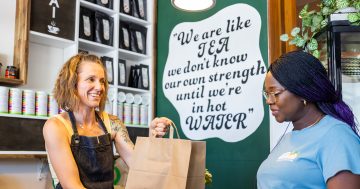
Small business owners are the eyes and ears of the community. Photo: File.
The Australian Government recently raised the national terror threat level to “probable” after being lowered in 2022.
Any national security situation is challenging for all of us as we try to understand the dangers and risks.
In 2015, when security levels were previously raised to ‘probable’, I, in my role as CEO of COSBOA, was approached by security bureaucrats to communicate with small businesses about what they can do in times of higher security needs.
Government agencies involved in national security wanted small business people to report anything they considered suspicious.
Small business people are represented in every industry and every community across Australia – they are critical to our security.
Those who operate from physical premises, not just retailers and those in hospitality but also those in offices and workshop-based businesses, have an enhanced awareness of what is happening in or around them and have always been an essential part of the security in our communities.
We have always kept a watch out for criminals and thieves, fire risks, dangerous situations, and hidden traps that might catch our workers or customers, and we work with the relevant authorities as necessary to help minimise risk.
We will share our concerns with our neighbouring businesses about something suspicious or odd that has occurred, such as a gang of shoplifters moving into an area (which happens in Canberra every few years as gangs of thieves move in from Sydney).
Many of us may need to get over a natural reluctance to ‘dob someone in’ to the authorities or get involved. Some would see it as un-Australian.
Yet, in times of high security risk, it is very OK for people to make the phone call and then let the authorities deal with the issue.
Small business people are in the sectors that deal with chemicals – the obvious ones are the stock and station agents and others in the agricultural sector.
Then there are the ubiquitous service stations with obvious access to highly flammable goods, but there are also pharmacists, hairdressers, garden nurseries, home hardware and so forth, who sell chemicals.
There are medical practitioners and suppliers who have access to drugs and health chemicals.
Suppose there is any odd purchase of large or abnormal amounts of chemicals, especially if that was paid for in cash. In that case, a phone call should be made, and then the authorities will do what is necessary as the business people get on with their business.
Then there is money laundering – if a considerable amount of cash goes through a business, it also should be reported.
Criminals will probably know that banks will (or should) automatically report large transactions in cash and other suspicious activities, so the criminal may attempt to launder their money through small businesses.
As an example of what can be reported, we go back to the awful events of 9/11 in New York with the destruction of the Twin Towers.
The terrorists had received training in how to fly an airliner but declined lessons on how to take off and land.
This was reported by the businesses involved as obviously odd but not treated with the urgency that it demanded.
This is also a very different issue from what small business policy and communications commonly address.
The critical industry associations will know how to communicate with their members so as not to alarm them but to build on their behaviours and values to keep members alert and connected.
Interestingly, the current Federal Government has not approached small business associations for assistance.
On that note, we are all connected at the community level, not via an office in the federal Treasury.
The message for Treasury and the security agencies is that if you want a small business person to report suspicious activities, remove some of the unnecessarily complicated compliance measures so that we can focus on the important issues.
Compliance and regulation are part of life, but they must be easy to do and necessary in the first place.
Back in 2015, there were also comments about the ‘profiling’ that may occur.
There was a belief from some that any odd-behaving but innocent person would be targeted and reported with dire consequences.
Small business people are part of their community; we know all the so-called odd people in and around us.
Usually, this is the unfortunate – the homeless, those who talk to themselves and so on.
The local police will also know these people. They won’t be reported.
The main focus is on new customers who do not fit into the business sector, who are buying things in quantity or acting in a way that the business owner – and the employees – know isn’t right.
Make a phone call to the National Security Hotline (1800 1234 00) and then leave it to the experts.
Peter Strong was a Canberra business owner and CEO of the Council of Small Business Australia (COSBOA) for 11 years. He has announced his candidacy as an independent in the 2024 ACT election.





















